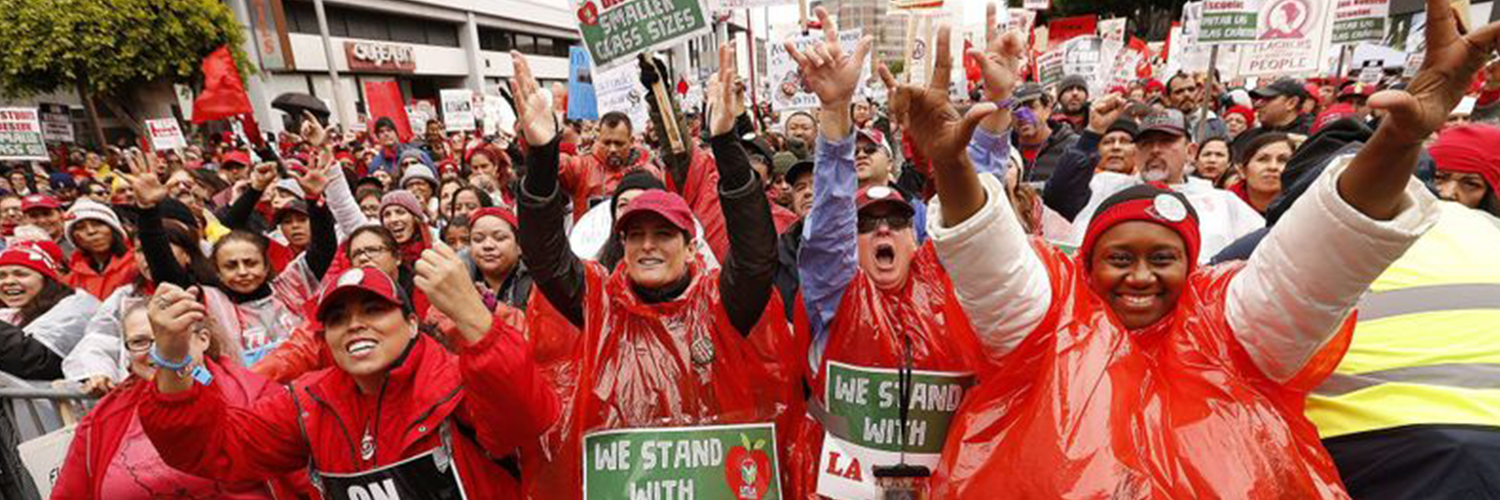With LAUSD teachers on strike for four days now, the LA Times ran an op-ed piece written by California Freedom Foundation Director and Vice President of Operations Bob Wickers and California Outreach Director Samuel Coleman.
The walkout has already cost the Los Angeles School District nearly $15 million on the first day, and it’s shaping up to be a costly strike that could have easily been avoided if the process was more transparent.
The full article can be found below.
This op-ed was originally published in the L.A. Times on January 17, 2019.
For nearly 22 months, United Teachers Los Angeles and the Los Angeles Unified School District have been negotiating behind closed doors.
And what is there to show for their bargaining?
More than 30,000 teachers have walked out of classrooms and are striking for the first time in three decades, disrupting the education of more than half a million K-12 students and the lives of their families.
Moreover, it’s difficult for the public to know how the strike came about. Was UTLA being unreasonable? Was LAUSD? Does the union’s decision to strike have less to do with increasing teacher pay and more to do with opposing non-union charter schools? Should LAUSD’s claim of budget constraints during a strong economy be taken at face value?
These are legitimate questions that none of us can answer. Even though taxpayers will have to fund whatever agreement is ultimately reached, the public knows virtually nothing about the proceedings. They won’t see any details until a final contract is approved, and they will likely never know about the offers and counteroffers along the way.
Transparency in negotiations involving public employee unions is prohibited by law in California, which means voters never know how public officials are performing one of their most important jobs.
It doesn’t have to be this way.
Many states and municipalities have ordinances mandating transparency in collective bargaining. Proposals, counter proposals and independent analyses are posted publicly. and negotiations are live-streamed. This kind of openness encourages adult behavior, good faith and compromise, and it can help avoid disruptive walkouts like the one we’re seeing now in Los Angeles.
There was a time in California when transparency wasn’t barred by statute, however, and a number of cities adopted so-called COIN laws, which stands for Civic Openness in Negotiations.
In 2012, Costa Mesa was the first to adopt such a law, and Orange County, Beverly Hills, Fountain Valley, Fullerton, Pacific Palisades and Rancho Palos Verdes soon followed.
This newspaper editorialized in favor of Los Angeles adopting its own transparency law after witnessing politicians signing off on city employee pay raises and other benefits “with little public vetting of the contracts or debate over the costs and long-term budget impact.”
But it wasn’t to be. Seeing COIN as a growing threat to their ability to negotiate favorable contracts, government unions pressured their friends in Sacramento to shut it down.
In 2015, the California Legislature passed, and the governor signed into law, a bill by then-Sen. Tony Mendoza that barred municipalities from adopting COIN laws. Mendoza, a former teacher and member of UTLA, received more than $486,000 in campaign contributions from unions between 2014 and his resignation from the California Senate in 2018 amid sexual misconduct allegations.
The law was a huge loss to California taxpayers. Scott Carpenter, who served as policy analyst for the Orange County Board of Supervisors during COIN’s brief tenure, said that he closely watched Costa Mesa’s open bargaining process and that it worked exactly the way it was intended. During the city’s negotiations with the Costa Mesa City Employees Assn., he said, all bargaining offers were submitted for public review, something he credits with reducing the number of unreasonable demands and public accusations of bad faith. A timely agreement was reached without even the threat of a strike.
Our experience at the Freedom Foundation in successfully advocating for open bargaining across the nation has convinced us that good laws should mandate at least three things: rapid posting of all proposals and counter proposals during negotiations, publicly available independent fiscal analysis and a way for people to witness the proceedings, either through live streaming or open meetings.
Opponents of bargaining transparency — especially government unions — say that opening up negotiations would hinder the ability for candid bargaining, threaten employee privacy and increase the risk of sensitive information being leaked.
But in our opinion, government employers and government unions shouldn’t be saying things in private they wouldn’t say in public. Regarding privacy, bargaining takes place on behalf of a bargaining unit, not an individual worker, so private information about individuals isn’t discussed during negotiations.
The bottom line is, taxpayers pay the salaries of public workers and therefore have a direct and compelling interest in the bargaining process. They deserve transparency.
Thirteen states, including Florida and Colorado, agree, requiring significant transparency in collective bargaining. Nine additional states allow for at least some kind of public access to negotiations.
The Freedom Foundation believes openness in collective bargaining is critical to California’s future, too.
Had an open bargaining ordinance already been on the books, Los Angeles’ students and teachers might well be in their classrooms today — where they belong — instead of at home or on the picket line.
Bob Wickers is vice president of operations and Sam Coleman is California outreach director of the Freedom Foundation, a national organization working to promote liberty, free enterprise and limited, accountable government.











